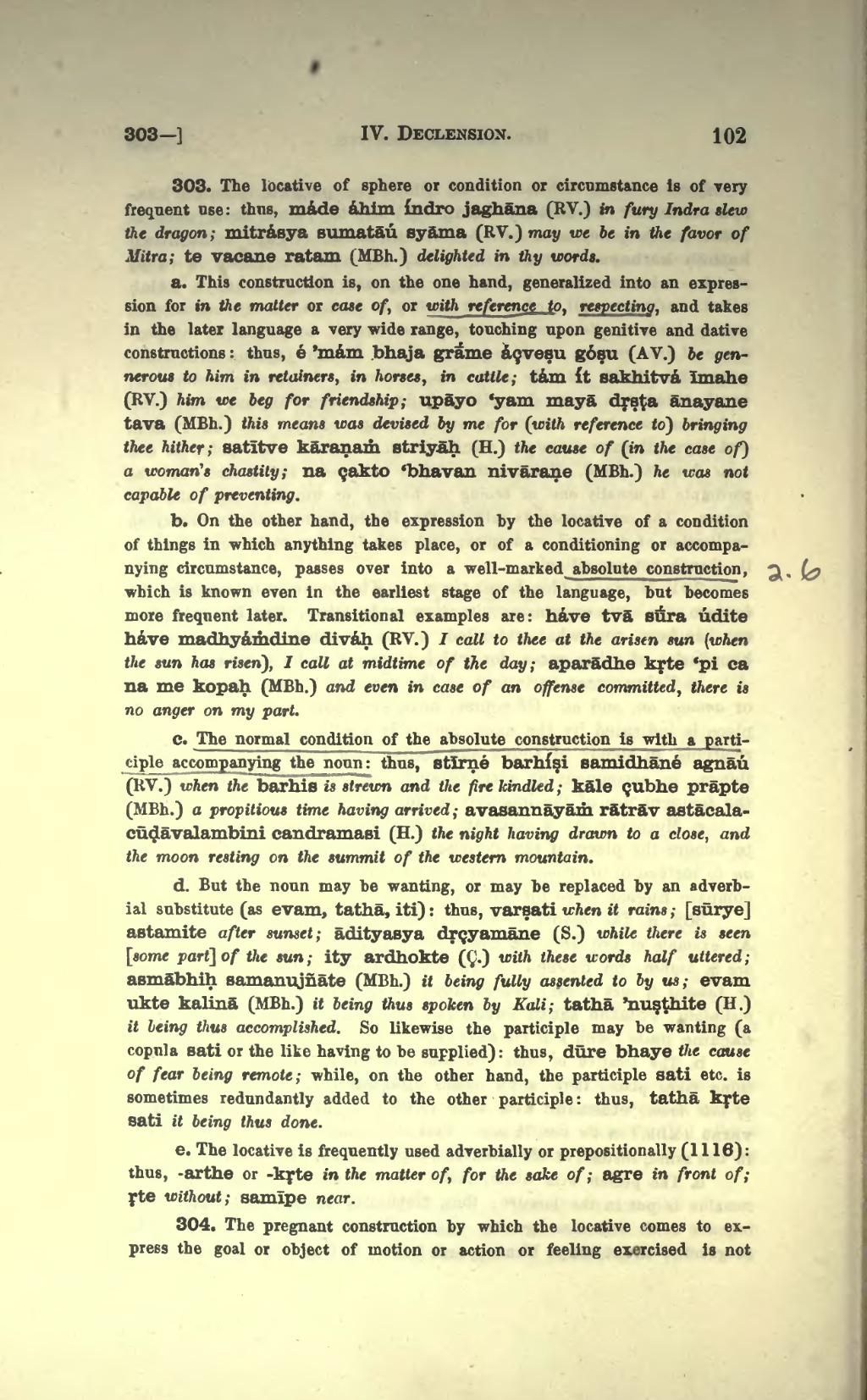303. The locative of sphere or condition or circumstance is of very frequent use: thus, máde áhim índro jaghāna (RV.) in fury Indra slew the dragon; mitrásya sumatāú syāma (RV.) may we be in the favor of Mitra; te vacane ratam (MBh.) delighted in thy words.
a. This construction is, on the one hand, generalized into an expression for in the matter or case of; or with reference to, respecting, and takes in the later language a very wide range, touching upon genitive and dative constructions: thus é ’mám bhaja grā́me áçveṣu góṣu (AV.) be generous to him in retainers, in horses, in cattle; tám ít sakhitvá īmahe (RV.) him we beg for friendship; upāyo ‘yam mayā dṛṣṭa ānayane tava (MBh.) this means was devised by me for (with reference to) bringing thee hither; satītve kāraṇaṁ striyāḥ (H.) the cause of (in the case of) a woman's chastity; na çakto ‘bhavan nivāraṇe (MBh.) he was not capable of preventing.
b. On the other hand, the expression by the locative of a condition of things in which anything takes place, or of a conditioning or accompanying circumstance, passes over into a well-marked absolute construction, which is known even in the earliest stage of the language, but becomes more frequent later. Transitional examples are: háve tvā sū́ra údite háve madhyáṁdine diváḥ (RV.) I call to thee at the arisen sun (when the sun has risen), I call at midtime of the day; aparādhe kṛte ‘pi ca na me kopaḥ (MBh.) and even in the case of an offense committed, there is no anger on my part.
c. The normal condition of the absolute construction is with a participle accompanying the noun: thus, stīrṇé barhíṣi samidhāné agnāú (RV.) when the barhis is strewn and the fire kindled; kāle çubhe prāpte (MBh.) a propitious time having arrived; avasannāyāṁ rātrāv astācalacūḍāvalambini candramasi (H.) the night having drawn to a close, and the moon resting on the summit of the western mountain.
d. But the noun may be wanting, or may be replaced by an adverbial substitute (as evam, tathā, iti): thus, varṣati when it rains; [sūrye] astamite after sunset; ādityasya dṛçyamāne (S.) while there is seen [some part] of the sun; ity ardhokte (Ç.) with these words half uttered; asmābhiḥ samanujñāte (MBh.) it being fully assented to by us; evam ukte kalinā (MBh.) it being thus spoken by Kali; tathā ’nuṣṭhite (H.) it being thus accomplished. So likewise the participle may be wanting (a copula sati or the like having to be supplied): thus, dūre bhaye the cause of fear being remote; while, on the other hand, the participle sati etc. is sometimes redundantly added to the other participle: thus, tathā kṛte sati it being thus done.
e. The locative is frequently used adverbially or prepositionally (1116): thus, -arthe or -kṛte in the manner of, for the sake of; agre in front of; ṛte without; samīpe near.
304. The pregnant construction by which the locative comes to express the goal or object of motion or action or feeling exercised is not
